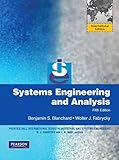Systems engineering and analysis
By: Blanchard, Benjamin S
Title By: Fabrycky, Wolter J
Material type: BookPublisher: Harlow, Essex : Pearson, c2011.Edition: 5th ed.Description: 800 p. : ill. ; 28 cm.ISBN: 9780137148431; 9780132217354Program: ENGG958Subject(s): Systems engineering | System analysisDDC classification: 620.0011 BL SY Online resources: Ebook | Location Map
BookPublisher: Harlow, Essex : Pearson, c2011.Edition: 5th ed.Description: 800 p. : ill. ; 28 cm.ISBN: 9780137148431; 9780132217354Program: ENGG958Subject(s): Systems engineering | System analysisDDC classification: 620.0011 BL SY Online resources: Ebook | Location Map | Item type | Home library | Call number | Status | Date due | Barcode | Item holds |
|---|---|---|---|---|---|---|
| 3 DAY LOAN | University of Wollongong in Dubai 3 day loan | 620.0011 BL SY (Browse shelf) | Available | T0046916 |
Previous ed.: c2006.
Includes bibliographical references and index.
This practical introduction to systems engineering and analysis provides the concepts, methodologies, models, and tools needed to understand and implement a total life-cycle approach to systems and their analysis. The authors focus first on the process of bringing systems into being—beginning with the identification of a need and extending that need through requirements determination, functional analysis and allocation, design synthesis, evaluation, and validation, operation and support, phase-out, and disposal. Next, the authors discuss the improvement of systems currently in being, showing that by employing the iterative process of analysis, evaluation, feedback, and modification, most systems in existence can be improved in their affordability, effectiveness, and stakeholder satisfaction.
ENGG958
